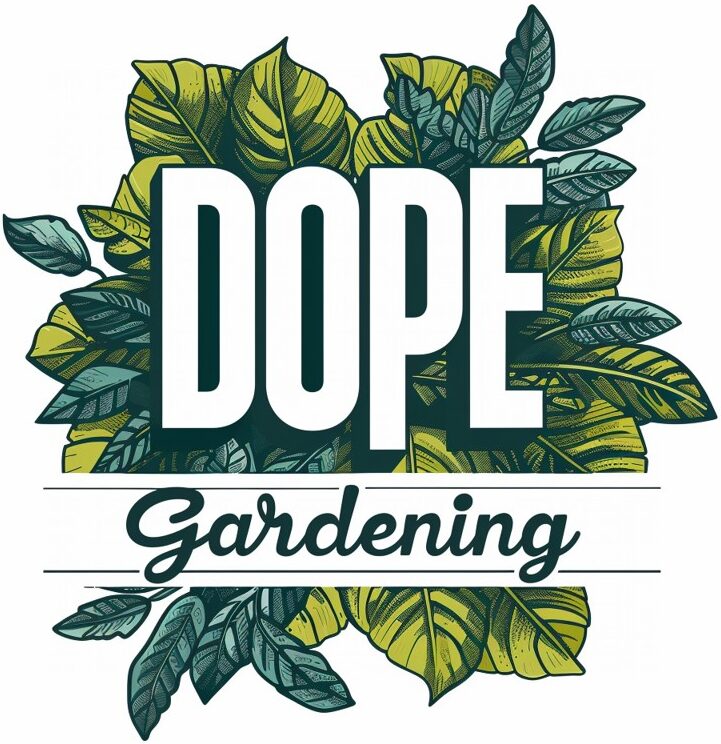Can You Put Onions in Compost? Tips and Benefits
Composting is a fantastic way to enrich your garden soil, but you might be wondering if you can compost onions. Yes, you can compost onions. They are biodegradable and break down like other vegetable scraps.
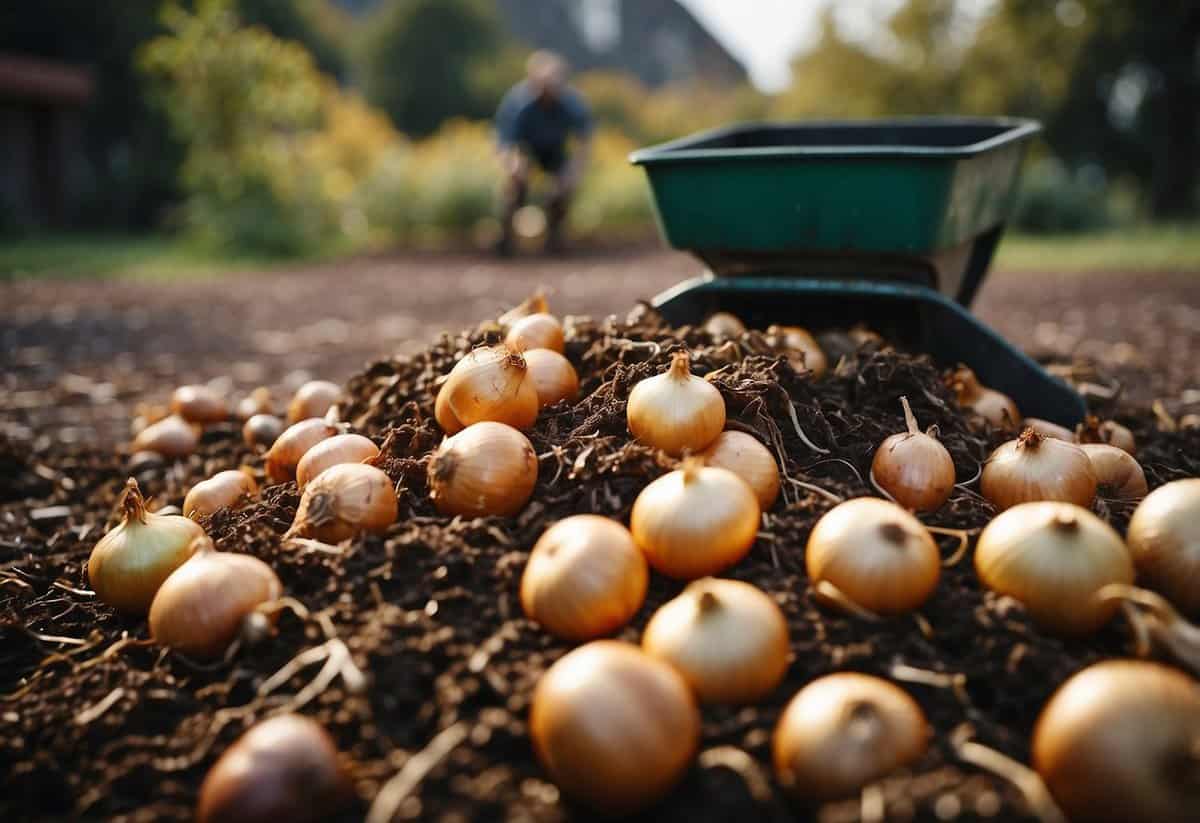
When adding onions to your compost, you should be aware of a few things. Onions can produce a strong odor as they decompose, so it’s best to bury them at least 10 inches deep in your compost pile. This helps to contain the smell and speeds up the composting process.
Mixing onion waste with other materials in your compost can help balance it out. Pairing onions, which are rich in nitrogen, with “brown” materials like leaves, which are high in carbon, creates a healthy compost mix. This will make your garden soil nutrient-rich and perfect for growing plants. For more detailed tips, you can visit Gardening Know How.
The Basics of Composting Onions

Composting onions can enhance your compost pile by adding valuable nutrients and organic matter. When composted in the right way, onions can improve soil quality and support healthy plant growth.
Benefits of Adding Onions to Your Compost
Onions contribute organic matter that breaks down into a nutrient-rich soil amendment. This process helps improve soil quality by increasing its fertility and structure. When you compost onions, you add essential nutrients such as nitrogen, which is vital for plant growth.
Onions decompose more effectively when chopped into small pieces. This increases the surface area, allowing microbes to break down the material faster. Make sure to mix the onion pieces into the center of your compost pile to avoid odors and protect them from pests.
Burying onion scraps about 10 inches under other compost materials can help manage any strong smells. Outdoor compost bins with good aeration are more effective for composting onions than enclosed composters. This ensures proper air flow, which speeds up the decomposition process.
Using well-composted onions in your garden contributes to creating nutrient-rich soil. This soil supports a healthy garden environment, promoting vigorous plant growth and better yields.
Preparing Onion Waste for Composting
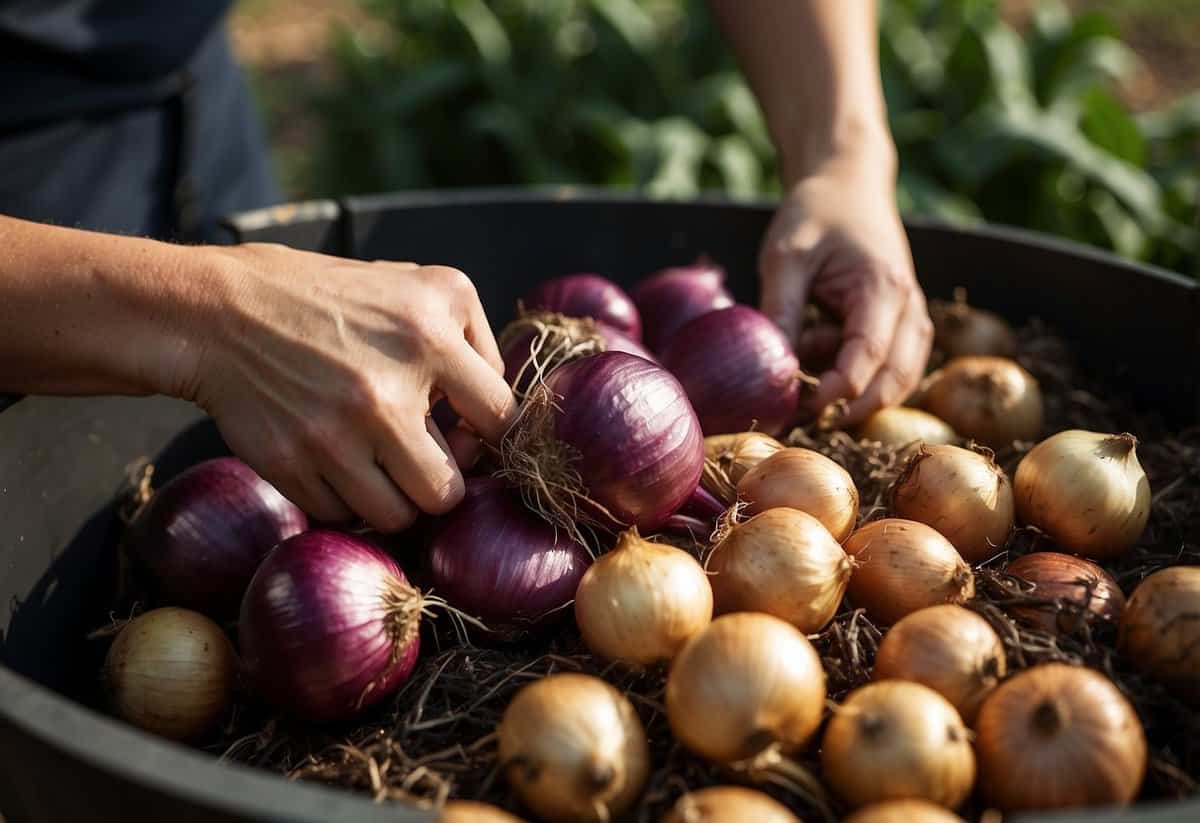
When adding onions to your compost, it’s important to prepare them correctly. This involves chopping whole onions and handling onion skins and peels properly.
Avoiding Whole Onions
Whole onions can take longer to break down in your compost pile. To speed up decomposition, chop onions into smaller pieces. This helps them break down faster and prevents attracting pests.
Avoid placing whole onions in the compost bin as they can create moisture pockets that slow down the composting process. If you have cooked onions, chop them as well. Raw onions should be chopped finely or diced before adding them.
Dealing With Onion Skins and Peels
Onion skins and peels are perfect for composting. They decompose quickly and add nutrients to your compost bin. Remove any sticker or plastic bits from the skins before adding them.
Spread out the onion skins and peels evenly in the compost pile. This helps prevent them from clumping together. Combining them with “brown” materials like leaves or straw can create a better balance of carbon and nitrogen, aiding decomposition.
Factors Affecting Onion Composting
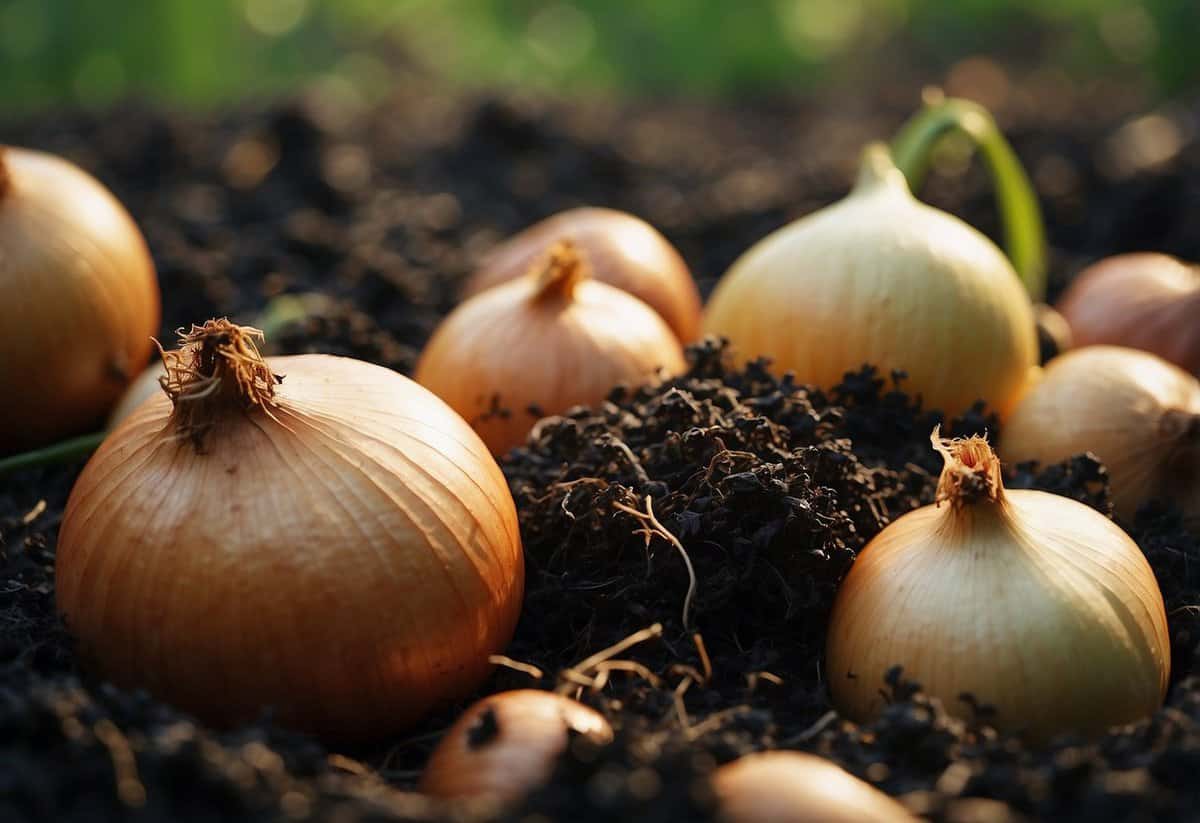
When composting onions, managing pH, controlling odors, and dealing with pests are crucial. Paying attention to these can help keep your compost healthy and effective.
PH and Acidity Concerns
Onions are slightly acidic, which can affect the pH balance of your compost pile. The ideal pH for compost is between 6.0 and 7.5. If the acidity from onions is too high, it might slow down the decomposition process and affect the activity of beneficial microbes and bacteria.
To balance the pH, mix onions with other organic materials high in carbon, like dried leaves or cardboard. This helps neutralize the acidity. Regularly check your compost’s pH levels using a soil pH tester. If needed, you can add agricultural lime to raise the pH or sulfur to lower it.
Odor Control
Onions can produce strong odors as they break down, which might attract pests. You can manage these odors by burying onion scraps at least 10 inches deep in the compost pile. Mixing onions with materials that decompose quickly and have less odor, like coffee grounds or grass clippings, can also help.
Turning the compost regularly improves aeration, helping to dissipate odors faster. An outdoor compost bin with a tight-fitting lid can be useful for keeping odors contained. Remember, a well-maintained compost pile should have a pleasant, earthy smell, not a strong, foul odor.
Pest Management
Onions can attract pests like rodents and insects if not composted properly. These pests might dig into the compost pile for the onion pieces. To prevent this, always chop onion waste into small pieces. Smaller pieces break down faster, making them less attractive to pests.
Use a compost bin with pest-proof features, such as fine mesh or tightly sealed lids. Avoid putting cooked onions in the compost, as oils and seasonings can make them more attractive to pests. Incorporating worms into your compost can also help speed up the decomposition process and reduce pest issues.
Optimizing Your Compost Composition
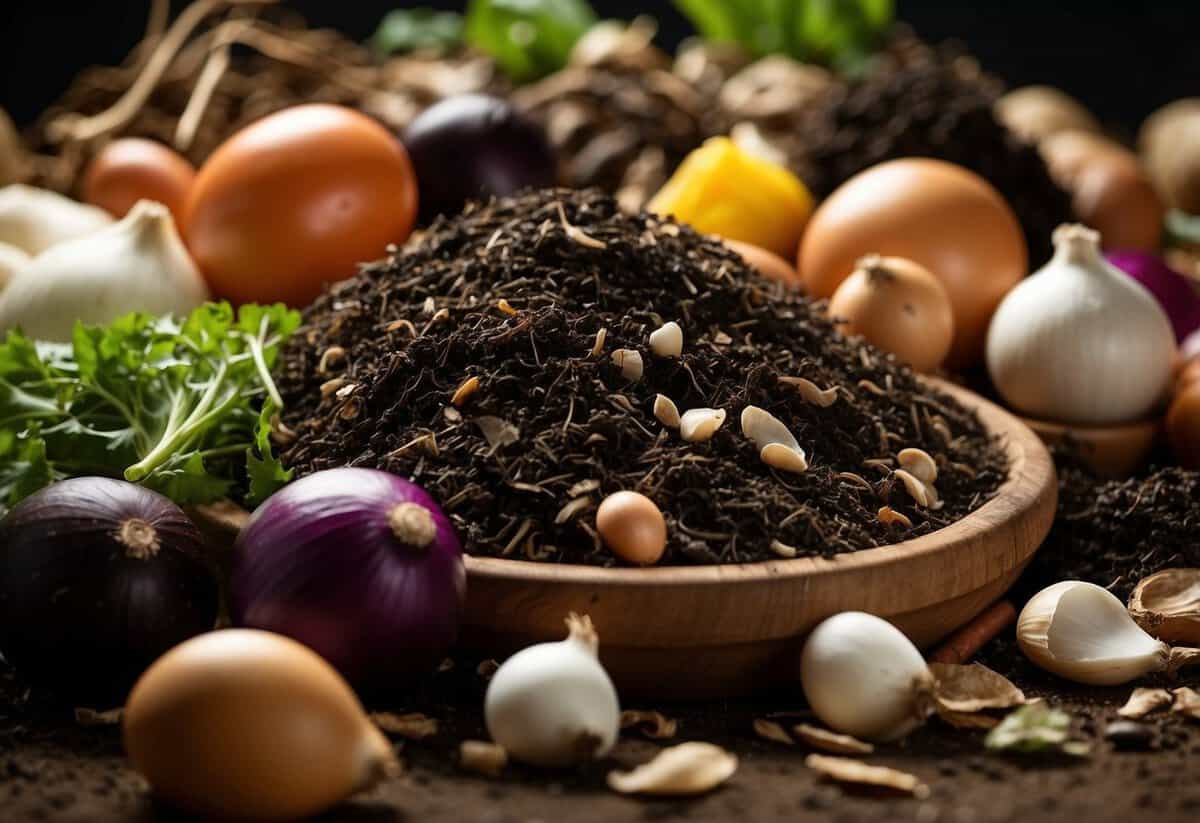
To get the best results from your compost, it’s important to balance different types of materials and ensure proper conditions for decomposition. Key elements include balancing greens and browns, and maintaining proper moisture and aeration.
Balancing Greens and Browns
Balancing greens and browns in your compost is vital. Greens are nitrogen-rich materials like vegetable scraps, grass clippings, and coffee grounds. Browns are carbon-rich items such as leaves, cardboard, and straw.
Maintaining a good carbon-to-nitrogen ratio (C
To achieve the right balance, add layers of greens and browns. Greens break down faster and provide nitrogen, while browns absorb excess moisture and add carbon. Mixing these materials in equal volumes (by weight) can work well.
Moisture and Aeration
Proper moisture and aeration are critical for a healthy compost pile. Moisture helps microorganisms break down organic materials. The compost should be as damp as a wrung-out sponge.
If your compost is too dry, add water or moist greens. If it’s too wet, incorporate more browns to absorb excess moisture.
Aeration is also key. Turning the compost pile regularly introduces oxygen, which is essential for aerobic composting methods. Aeration helps prevent unpleasant odors caused by anaerobic conditions.
Using tools like a pitchfork or compost aerator, turn your pile every few weeks. This helps distribute moisture and air evenly, speeding up the decomposition process.
Innovative Composting Techniques
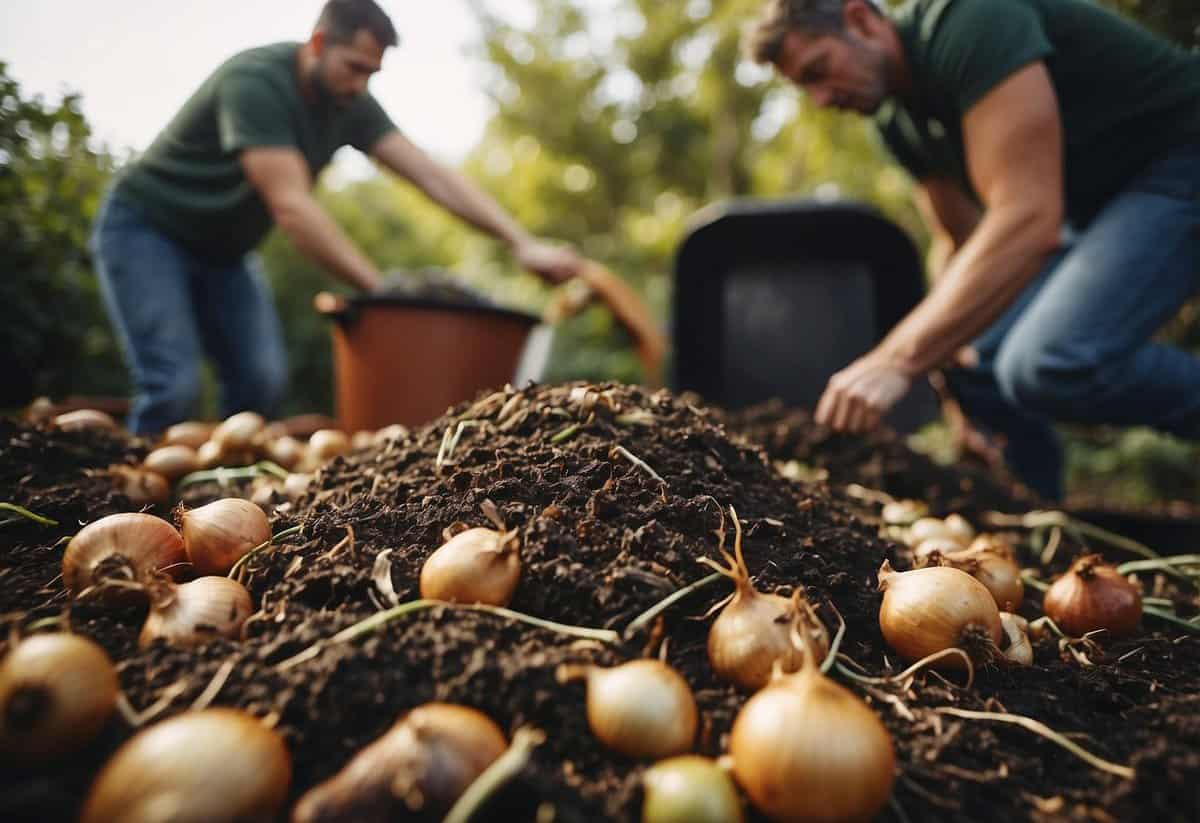
Using onions in compost can be enhanced through specific methods to get better results. Two effective ways to compost onions are vermicomposting and the Bokashi composting method.
Vermicomposting with Onions
Vermicomposting involves using worms to break down organic matter like kitchen scraps, including onions. To start, you’ll need a worm bin with a bedding material like shredded paper or coconut coir. Red wigglers are the best worms for this job.
Chop onions into small pieces before adding them to the worm bin. This helps the worms digest them easier and faster. Mixing onions with other vegetable scraps is essential to maintain balance. Onions alone can be too acidic, so mixing helps worms stay healthy.
Make sure to monitor the moisture levels and avoid overloading the bin with onions. Too many onions can make the environment too moist or acidic for the worms. Still, when done correctly, vermicomposting is a sustainable way to recycle onion waste and enrich your garden soil.
Bokashi Composting Method
The Bokashi composting method ferments food waste using beneficial bacteria. You’ll need a Bokashi bin and special Bokashi bran inoculated with microorganisms. This method is unique because it can handle more challenging materials, like onions.
Chop onions into smaller pieces before adding them to the bin. Layer the food waste with Bokashi bran, making sure to press it down to remove air. This anaerobic process is different from traditional composting.
After filling the Bokashi bin, allow it to ferment for about two weeks. Once fermentation is complete, the result can be buried in soil to finish decomposing. This process turns onions into nutrient-rich compost faster than typical methods. It’s particularly useful if you’re focusing on self-sufficiency and sustainable living.
